C.A. Gray's Blog, page 7
October 11, 2024
Review of Antifragile
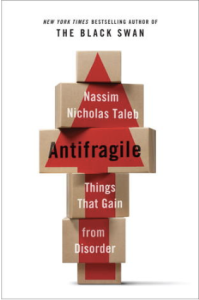
I’m having a hard time rating this book; I don’t really know how I feel about it. It’s complicated.
I finished “Black Swan” and immediately looked this book up, recalling the title but not realizing at the time that it was written by the same author. What intrigued me from “Black Swan” was exactly this concept of systems that actually benefit from random Black Swan events, becoming stronger as a result of them. I wanted to know how one becomes “antifragile,” which is why I read it.
I don’t feel like I exactly got an answer to that question, though the concept fleshed out what I’d already intuitively understood but lacked the language to describe about the intervention-heavy approach to regulating large systems of every kind. Our economy, our government, our approach to climate, our system of medicine, are all predicated on the idea that WE know best, and WE can intervene to “fix” the thing that broke. Even if this seems to work temporarily, the long-term effect is always, always, to make the system more brittle than it was before. When the system finally breaks the next time, it’s going to be that much more catastrophic and irreparable. That’s why quantitative easing is such a stupid idea, as are nearly all economic interventions meant to artificially prop up the economy. It’s why suppressing inflammation with steroids (except in life-threatening situations) is completely counter-productive. Our bodies, our economy, our environment, etc all operate via intricate, self-regulating feedback systems. But if we intervene to prevent these systems from doing what they do best, we will invariably cause side effects, and (worse), the underlying problem will still be there. When it finally reemerges, it will take ever more heroic measures to kick that can down the road again, and the final collapse will be that much more disastrous.
Taleb uses a lot of examples in the book of hormesis, or the concept that “the dose makes the poison,” in medicine (though he made a point early on that this is NOT the same thing as antifragility, which is where something becomes better in response to randomness, rather than simply being resilient). Most of my favorite therapies in medicine are hormetic, but I was put off by his browbeating of anyone too stupid to understand the nuanced difference between hormesis and true antifragility. (A lot of hormetic therapies I think *do* make people stronger than they would have been without them.) Much of my distaste for the book comes from this overall sense that the author would almost certainly call me a moron if he ever met me.
The other problem I had with the book was that, beyond what I mentioned above, I’m not sure I came away with any concrete action steps, which is why I read it in the first place. If they were there, I missed them. (Probably because I’m a moron, I’m sure.)
My rating: ***1/2
Language: none that I can recall
Sexual content: none
Violence: none
Political content: it’s there, but very subtle, and more on the conservative rather than the woke side
The post Review of Antifragile appeared first on C.A. Gray.
October 3, 2024
The 1916 Project

Astounding, and disturbing. I raced through this and felt like I’d gotten massively “red-pilled,” as they say in the Matrix. I had absolutely no idea the depth and intricacy of the connections between Sanger, the Third Reich, eugenics, Darwinism, and cultural Marxism, nor how such disparate ideas could all be interconnected… but they are, in astonishing ways. What these all have in common, as Gruber points out, is that they all stem from man’s attempt to get back to the Garden of Eden on his own terms, to create a utopia without redemption.
Thomas Sowell pointed out in “A Conflict of Visions” that what truly separates conservatives from liberals is the concept of original sin. If you believe that mankind is inherently sinful, you’ll create a system designed to keep that sin nature in check. If you believe that mankind is inherently good, then man should be able to create heaven on earth, through legislation, social justice, redistribution of wealth, etc. Or maybe through taking “survival of the fittest” to its logical conclusion (if you believe there is no God, why not?). The original “follow the science” (to its logical end) was the foundation of the eugenics that inspired the Third Reich… and they borrowed it from America, from Sanger and her compatriots.
This is a tough book to read, and I wouldn’t recommend it right before bed, I’ll tell you that much. But it’s important, and it explains a lot.
My rating: *****
Language: none
Sexual content: heavy, but it’s not there to be gratuitous.
Violence: shocking, but it’s not there to be gratuitous
Political content: HEAVY (but the polar opposite of woke)
The post The 1916 Project appeared first on C.A. Gray.
September 24, 2024
The Book of Doors, Gareth Brown
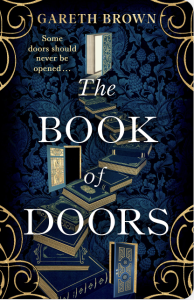
Clever and compelling!
The prose was what sucked me into this one, which rarely happens. There wasn’t a lot of action at first… the story started out with young Cassie, closing up at the bookshop where she works, while speaking to an elderly customer whom she had befriended. Distracted when it begins to snow, Cassie turns back around to find that Mr Webber has quietly died. In the hubbub of the authorities taking the body away, Cassie realizes that stacked on top of the book that Mr Webber was reading is a book with a note to her inside, from Mr Webber. It’s the Book of Doors, and it appears to be largely blank pages… at first. Later, though, Cassie realizes through experimentation with her roommate Izzy that if she envisions a door, any door she’s ever walked through before, anywhere in the world, the book will act as a portal to that place, through that door.
At first this just seems like a fun novelty, but like there probably wasn’t a lot more the author could do with that idea… until they run into one good guy (Drummond–great name) and a couple of very bad guys who are after them, because they want the Book of Doors desperately. This is because the book will not just open any door in the world now, but at any time in history–past, present, and future, too. Not only that, but the Book of Doors is one of many magical books, created for some unknown reason and at some unknown time, but desired by various nefarious villains for their own private reasons. These include the Book of Shadows, The Book of Mist, The Book of Illusions, The Book of Despair, the Book of Pain, The Book of Joy, and many others.
Once we introduce the idea of time travel, Cassie, Izzy, Drummond, and those later in league with them race through time to try to outsmart several of the villains and prevent them from ever getting their hands on the books. The prose is gorgeous, as is the characterization, and the twists and turns were actually not too hard to follow, even though there were some backward causation paradoxes involved, like there nearly always are in time travel books. The main villain is a complete sadist, and that was overdone, I thought… I got the idea without having to dwell on it to the extent we did. And there is a decent amount of bad language. But other than that, it’s very well done.
My rating: ****1/2
Language: it’s there… kind of a lot.
Violence: yeah. Pretty gnarly
Sexual content: none
Political content: none
The post The Book of Doors, Gareth Brown appeared first on C.A. Gray.
September 20, 2024
The Republic, Plato

I’m currently taking a philosophy course from Hillsdale College with my husband, and that piqued my interest in reading “The Republic.” I’d read just a couple of small segments of it before: the cave analogy, and the Ring of Gyges when I was researching for I think “The Atlantis Bloodline.” I mean, I guess it’s silly to say this, because everybody already knows this, but it’s brilliant.
First of all, the Socratic method isn’t quite what I thought it was. I’d always understood it to be JUST a series of questions, probing what the other person thought and getting them to articulate their own position and identify their own fallacies in the process, rather than pointing them out oneself. All the while, I thought the questioner maintained the idea that he knew nothing, and therein lay his wisdom. While Socrates does do this some, the majority of the dialogue involves his listeners probing him on the details of his own thinking and opinion, taking his ideas to their logical conclusions. I get the impression that (if this was a faithful representation of his conversations at all,) Socrates was working out his own ideas in the process of the dialogues. Dialogues are also a much easier read than straight prose essays on philosophical ideas, which are often dull as dirt. These read almost like a novel. I found myself wondering if any of his interlocutors were based on real people.
While the purpose of the Republic is to describe the ideal city, Socrates has to start by identifying what constitutes an inherent good–whether there is value in the various virtues in and of themselves, or whether they are a means to something else. This is brilliant, and should be required reading for every high school student–especially these days, when so many are confused about concepts of right and wrong. In the process of this exploration, Socrates ends up describing why the youth should not study the stories of the Greek gods, because they teach them bad values (interesting when we recall that Socrates was put to death for heresy)… and then he goes on to describe what God must be like, from just the standpoint of logical consistency. My jaw dropped, as this philosopher from before the time of Alexander the Great described the Christian God, and only the Christian God, to a T. His theology was better than that of most Christians, and he got there by pure logic, without a Bible or even (presumably) without knowledge of the Jewish Torah.
I’ll have to go back through my notes on this and chew on it some more. But truly, this should be a required text.
My rating: *****
Language: none
Violence: none
Sexual content: none
Political content: none
The post The Republic, Plato appeared first on C.A. Gray.
September 13, 2024
Review of The Gingerbread Queen

I loved previous books by Carrie Anne Noble, as well as fairy tale retellings in general, so I eagerly awaited the release of this one. I almost gave up on it the first time around–I did, in fact, until I saw that Jeff Wheeler recommended it. He’s also one of my favorites, so I decided to give it another go. I’m not sorry I finished it, but my opinion of it really never changed, though.
The story follows Marga (the grown-up Gretel of ‘Hansel and Gretel’–she changed her name due to the trauma of her childhood). Once she and Hansel returned to their village after she’d successfully offed the witch, their parents died, and they had only each other. The stigma of their experience followed them–or her, anyway, because for whatever reason, the townspeople began to whisper that Marga herself was a witch and shunned her. Hansel, meanwhile, grew up to be a dissipated and selfish gambler, which basically just serves as an impetus for the story’s action. His debts force the siblings to flee back into the forest, and take refuge in, of all places, the Gingerbread cottage once more. In order to get to it, they have to hitch a ride on the back of an enchanted duck, who turns out to be the witch’s cursed husband. As the time approaches for the curse to be undone, his human understanding begins to return., and he recalls the prophecy of what has to happen in order for him to become a man again. He knows it involves helping Marga to take her rightful place as the witch’s successor.
But Marga, despite the townspeople’s beliefs, is innocence personified. The last thing she wants is to display any kind of magic, or to be anything like the witch. She’s had a crush on a village baker for years, and it turns out he has had one on her as well (this part reminds me a bit of Peeta from “The Hunger Games,”) and when Hansel abandons Marga to her own fate, he comes to her rescue. But the duck (increasingly less duck-like) conspires to force the prophecy that will finally set him free…
I can’t entirely say what it was about this book that didn’t do it for me. It’s whimsical, it’s clean, and it’s imaginative. I guess mostly the issue is that I didn’t find the characters believable enough to be sympathetic, and I had a hard time suspending my disbelief in some very absurd scenarios. But it’s good for light pre-bedtime reading.
My rating: ***
Language: none
Sexual content: none
Violence: none
Political content: none
The post Review of The Gingerbread Queen appeared first on C.A. Gray.
September 5, 2024
Water Codes, Carly Nuday
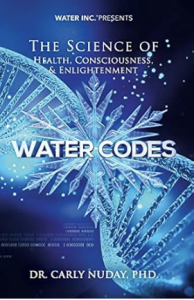
It’s so hard to find books on frequency-based therapies with scientific grounding. This is one of them.
Ever since reading Gerald Pollack’s “The Fourth Phase of Water,” I’ve been trying to understand the implications of structured water for our own bodies. I recently learned of a company that claims to make glass water bottles that will “structure” the water within, and was skeptical–mostly because I really don’t understand material science. Isn’t glass, just glass? (But then again, isn’t water, just water? Apparently not!) After reading this book and taking copious notes, I have more questions than answers, mostly of new things I need to learn about. For instance: how exactly do silicon chips store data? (Ones and zeroes, yes, I know. But from a literal, structural standpoint, what does that mean?) How do fractals actually store information–is the information in the structures themselves? And if so, how can it possibly be extracted? It seems the answer to these questions will also explain how crystals can store information (apparently they are nearly perfect for this purpose, far less subject to entropy than most other mediums), and how water can do so as well. The body can apparently “store” memories in structured water, but how? What does that mean? And if you make new memories, there’s only so much water in your tissues–how do you avoid accidentally overwriting them?
There were also a lot of chapters on how water is sacred to a number of religions. I skipped these chapters, not because I didn’t believe it, but simply because I didn’t need to be convinced and that wasn’t what I was really seeking to know, anyway.
I’m especially grateful for the author’s “recommended reads” section at the end. I’ll be following her down that rabbit hole…
My rating: *****
Language: none
Sexual content: none
Violence: none
Political content: none
The post Water Codes, Carly Nuday appeared first on C.A. Gray.
August 26, 2024
The Biology of Belief, Bruce Lipton
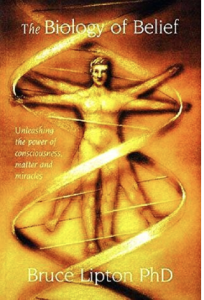
This was a reread… I first discovered this book in I think 2012 or so. It confirmed what I already believed about the importance of our beliefs on our health, though I didn’t agree with a lot of the author’s specific spiritual conclusions.
There was one standout concept that made me reread the book now, and that was the concept that the “brain” of the cell is not the nucleus, as was so long believed, but rather, the cell membrane. This seemed so counterintuitive–the nucleus houses the DNA necessary for cellular replication, though, so it’s more akin to the gonads, while the cell membrane had previously been conceptualized as the skin… but really, it’s the gatekeeper that determines what gets in and what gets eliminated. Without a cell membrane, the cell dies, but without the nucleus, it simply cannot reproduce. I’d hoped he would go into this in greater detail than he actually did though (I’d just read Jerry Tennant’s “Healing is Voltage,” in which he contends that the cell membrane is actually a battery pack, and I was hoping Lipton would somehow comment on or corroborate this. He did not.) This book really doesn’t get into a lot of nitty gritty details; it’s more of a general read.
One study really stood out to me, though, and I’ve referenced it in conversation since the first time I read it, but didn’t remember that this is where I heard about it. In the chapter on aging, Lipton refers to the “rewind” study, in which elderly men with various physical ailments were invited to a retreat in which all of the media, decor, and the environment was designed to mimic that of the decade of their youth. At the beginning of the week, many arrived on walkers, with canes, etc. By the end of the week, they were playing touch football. The point was that so much of what we believe about aging is a self-fulfilling prophecy. The complete immersion in an environment that made these men remember their younger selves brought about remarkable physiologic changes in a short period of time.
My rating: ****
Language: none
Sexual content: none
Violence: none
Political content: none
The post The Biology of Belief, Bruce Lipton appeared first on C.A. Gray.
August 19, 2024
Review of Emotional Intelligence
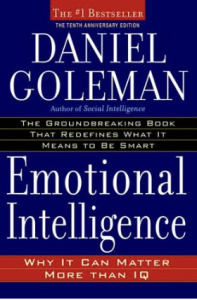
I read “Social Intelligence” (which I think was meant to be a sequel to this one) many years ago, and then it inspired me so much that I decided to go to grad school in cognitive neuroscience (which didn’t last for a variety of reasons–it was my last stop on the way to deciding on naturopathic medical school). But I’d never picked this one up before. As I was studying AI and how synthetic emotion differed from human emotion, I finally gave it a listen.
I think, had I listened to this all those years ago too, I’d have loved it. Now, though, I’ve read so many books on the research into emotion that I really can’t think of a single stand-out takeaway from this book that I hadn’t already read somewhere else. I certainly was impressed again with the idea that one’s success in life (certainly socially and relationally, but also in career and maybe even in happiness) has a great deal to do with how well we can not only read others’ emotions, but also respond to them appropriately. I winced at some of the chapters depicting socially awkward children, and the impact this awkwardness can have upon their present happiness and future prospects. (A few people I knew growing up immediately came to mind.) Some of the studies designed to coach socially awkward children are very promising, and I hope they will become widespread.
My rating: ****
Language: none
Sexual content: none
Violence: none
Political content: none
The post Review of Emotional Intelligence appeared first on C.A. Gray.
August 12, 2024
Review of Darcy’s Story

I devoured this book in about a week, after I rediscovered the BBC miniseries version of “Pride and Prejudice,” which then made me wish for the hundredth time that there was some as-yet-undiscovered (to me) Jane Austen novel that I could read for the first time. (Not that all of her books are equally good… I think there are three good ones, and “Pride and Prejudice” is the best of the three.) But I found this, and thought, perfect! A way to experience the same story, but from a fresh angle…
And it was that, for the first half of the book I’d say. For the most part, the author does a great job of emulating Austen’s narrative voice, though there were a few formatting issues that confused me here and there (like the same character is speaking, but we’re on a new paragraph, and the previous paragraph’s quotations were closed, so it looked for all the world like somebody else is talking now.) It was fun to imagine what Darcy might have been thinking during the scenes leading up to his first proposal, and how Elizabeth’s behavior might have seemed to him then.
I think it was after that that the book really went downhill for me, mostly because Darcy then becomes a pining mess for Elizabeth. He literally doesn’t think about anything else. Which I guess is what we’d expect, since that’s the whole point of *this* book (his relationship with her)… but not only did I not buy that this stately, wealthy, distinguished man has nothing else going on in his life, I also ceased to respect him because of it–or I would have, if not for the fact that the character became so unbelievable that it pulled me out of the story. While Austin’s plots did revolve around romance and marriage, there was always more going on, too: peripheral relationships, amusing social depictions, and the like. Even so, I was invested enough that I finished the story, and it did get better once Elizabeth put him out of his misery and did agree to marry him after all.
My rating: ***1/2
Language: none
Sexual content: none
Violence: none
Political content: none
The post Review of Darcy’s Story appeared first on C.A. Gray.
August 9, 2024
Stardust, Neil Gaiman
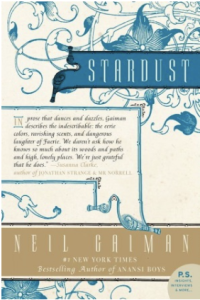
I loved the movie, but I never read the book before (though I guess I thought I had)…
Most Neil Gaiman stories are quite dark, but this one (mostly) was lighthearted and fun. Tristran Thorn thinks he’s ordinary, and sees a falling star on the other side of the Wall in his city, blocking their citizens from a world beyond. Nobody crosses the wall… but he vows to capture the falling star in order to win the hand of his love, Victoria. He gets far more than he bargained for, discovering that the fallen star is actually an injured woman, and there are a passel of warring princes and a witch after her too, for a variety of reasons. While she resents and hates Tristran at first, eventually he becomes protective of her, and later falls in love with her. (The film makes this part a much bigger deal… Gaiman is understated and almost blase on this point). Adventures ensue, and along the way, Tristran also learns his true identity.
It’s a fun story with a happily ever after ending, and (unlike most Gaiman books) no sordid sex or grisly murders, which is a nice change.
My rating: *****
Language: none
Sexual content: none
Violence: present but almost comical, very tongue-in-cheek
Political content: none
The post Stardust, Neil Gaiman appeared first on C.A. Gray.



